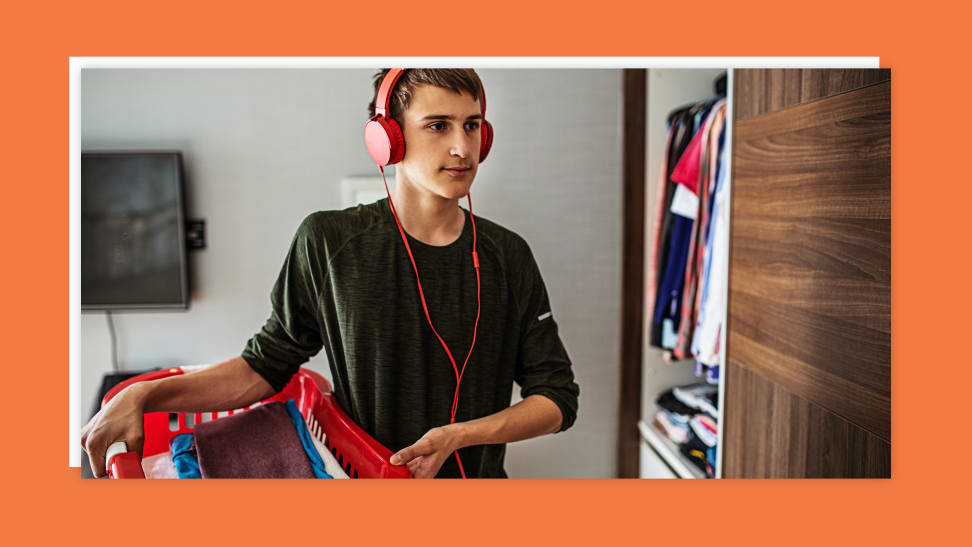8 expert-recommended ways to keep teens off their phone this summer
Screen time doesn’t have to be all the time
 Credit:
vitapix
Credit:
vitapix
Products are chosen independently by our editors. Purchases made through our links may earn us a commission.
Parents know the drill. The sun is out and your teenager is holed up in their room, playing video games and scrolling through the latest trending site on their cell phone. With school hours gone and summer lazy in full effect, the potential to disappear into a virtual world is higher than temps on a beach day.
While locking their smart phone away seems tempting, clearly it’s not a viable (or welcome) solution. Teens and tweens frequently rely on their phones during summer break to text message with friends and stay up-to-date on sports and job schedules. When all of these empty summer days need to be filled, how do you get them to walk the fine line between useful usage and unhealthy fixation?
“Once your kids get into teen years, you’ll need to get more creative, collaborative, and persistent to have continued success reducing phone use,” says Suzanne Button, senior clinical director of knowledge and advising at The Jed Foundation. “[Collaborating] with your teen can help you be more effective with the final, potentially powerful strategy for reducing phone use.”
We asked experts about how to decrease your teen’s cell phone time when school isn’t in session. Through a combo of enjoyable and productive activities for teens, plus some manageable screen time limits, your kids will stop “phoning in” their involvement in summer fun.
1. Give reasons not just requests
While a sweeping “get off your phone” is easy to shout, explaining the “why” behind the request could get you further. “Talk with your teen about the impacts of screen time. Get information they can read or watch about the negative effects of too much time on a screen or phone,” says Button.
As part of the process, your teen should communicate the times they need to have access to their phone to keep everyone’s expectations realistic. Revisit this conversation periodically throughout the summer.
2. Ditch the cell phone (for a set amount of time)

Hang out with friends.
A hypothetical scenario sometimes gets the creative juices flowing. If phones never existed, what would your child enjoy doing? “Ask your teen, ‘What, for you, is more fun than being on a phone?,’” suggests Button.
While the answer might require a little thought (and could elicit an eye roll), having them come up with fun, fruitful summer activities that interest them will more likely translate to participation with enthusiasm—and without a phone.
3. Embrace boredom
If they can’t come up with something to do during their free time, that’s OK too. “Boredom is where imagination and creativity happen, especially for children. Rather than avoiding boredom by filling one’s mind with other people's ideas and images (hello, social media), help them use that brain space and unstructured time to create the new,” says Dr. Michael Rich (aka “The Mediatrician”), director of the Digital Wellness Lab at Boston Children's Hospital.
If your teenager is inclined, expose them to art, writing, photography (yes, even using their phone), reading, and the like by supplying them with journals, sketch pads, and more.
Get Totally Obsessed: A Journal for the Awesome, Random, and Weird Stuff You Love at Amazon for $15
4. Get outdoors

Biking is a great outside activity.
Whether it’s going old school on roller skates, speeding around on a high-tech e-bike, or just hitting the trails, taking advantage of the outdoors IRL shouldn’t be missed—for wellness’ sake.
“The World Health Organization reported that COVID-19 was the trigger for a whopping 25 percent increase in depression and anxiety globally. Sadly, kids were well-represented within that group,” says Robert Pasin, third-generation owner and CEO of Radio Flyer, the iconic red wagon company. “Play—particularly outdoors—is critical to the well-being of kids. Being outdoors is proven to lower cortisol, blood pressure and heart rate, and boost creativity and cognitive development. It’s more important than ever that we get outside and play, whatever that may look like.”
“Children are suffering from Nature Deficit Disorder, in large part because screen use has displaced it,” agrees Rich. “Nature calms and centers us, brings us back to what is essential. There are even travel guides to places off the grid, but it may be more fun to challenge yourselves as a family to find places with zero bars.”
Also don’t underestimate the power of splashing around in a pool, lake, or ocean. As Rich points out, phones and water don’t mix.
Get C SEVEN Skates Quad Roller Skates at Amazon starting at $55
5. Respect their need for independence

Teens need both independence and limits.
The more autonomy you give your teenager, the more successful you’ll be in your quest to set limits and get them off their cell. Ask your teen to identify things that they enjoy and encourage them to schedule those things, says Button, whether it’s a bike ride, hike, pick-up basketball game, or just a walk to get ice cream with a friend.
Sweeten the deal further by letting them make their own decisions around summer responsibilities. “Chores are a great way to reduce phone use, get things done around the house, and prepare your teen for life,” says Button.
One good idea is to have them make a list of everything that needs to be done in the house and assign themselves chores. “Let your teens choose the music to play during house or yard work,” she continues, adding they can also decide when to do those chores provided it’s in an agreeable timeframe.
6. Set some summer goals

Yes, it's possible to have fun without a phone.
Bucket lists aren’t just for adults. “Having your teen create very small to big goals for the summer will help drive their motivation and be a ‘go to’ when boredom strikes,” says Jennifer Libby, a New York-based outpatient psychotherapist specializing in adolescent mental health.
“The human brain loves dopamine, a chemical produced when we’re ‘seeking’ something such as a new experience. Our phones are constantly giving our brains little hits of dopamine as we’re seeking new information through unlimited content. When we set little, achievable goals in real life, those goals become the things we start to seek,” she continues. “[We] get excited about the thought of actually completing the goal; thereby, giving us those little hits of dopamine, so we might actually be able to pull ourselves away from the phone.”
Libby’s new app, Promly, offers suggestions to help 13- to 19-year-olds beat boredom through community building and goal-tracking. “Since kids are on their phones anyway, we have to start where they are at to be successful in empowering change,” she says.
Although an app may seem counterintuitive—directing kids to their phones to get them off their phones—she says the point is to inspire kids to actually get off the mindless scrolling and start achieving even small goals. “The hope is that they go on, get inspired to learn or do something, then go do it.”
7. Teach your child by example
Now isn’t the time to parent with a “do as I say, not as I do” attitude, according to Rich.
“[Kids] model their behavior on yours,” he says. “Summer is a great time for all of us to put our phones away and enjoy each other, especially during meals and other family activities.” He suggests a family challenge, seeing who can go longest without touching their phone.
Button agrees: “It's not always easy, but family ‘rules’ about phone use go a long way to mediate teen phone use. Ask yourself, ‘How often do my kids see me on my phone?’ Role modeling can include saying, ‘We all have gotten into a bad habit of staring at our phones. I’m going to lead us off working on more healthy phone habits and put my phone away for a few hours every day. Let’s plan to spend some non-screen time together each week.’”
Leading by example also has a place during play time. “Getting kids moving must be focused on having fun, and caregivers should be physical activity role models,” she continues. “Instead of saying, ‘Go outside and play,’ try saying, ‘Let’s all go for a bike ride or walk.’”
“While expectations and boundaries around phone use are important, if you aren’t willing to role model certain rules, you won’t be able to enforce them,” she warns.
8. Create a cell phone contract
With summer’s increase in downtime and more opportunities to use interactive media, there’s clearly a greater need to set expectations and daily limits. Rich suggests employing a family media use plan during the summer months, such as those found in the Family Digital Wellness Guide and Parent’s Guide to Media Use Agreements.
“Patience, persistence, humor, and humility are key components for parenting teens,” concludes Button. “No strategy works all the time. It’s important that caregivers keep trying and keep collaborating with their teens around phone use.”
The product experts at Reviewed have all your shopping needs covered. Follow Reviewed on Facebook, Twitter, Instagram, TikTok, or Flipboard for the latest deals, product reviews, and more.
Prices were accurate at the time this article was published but may change over time.


